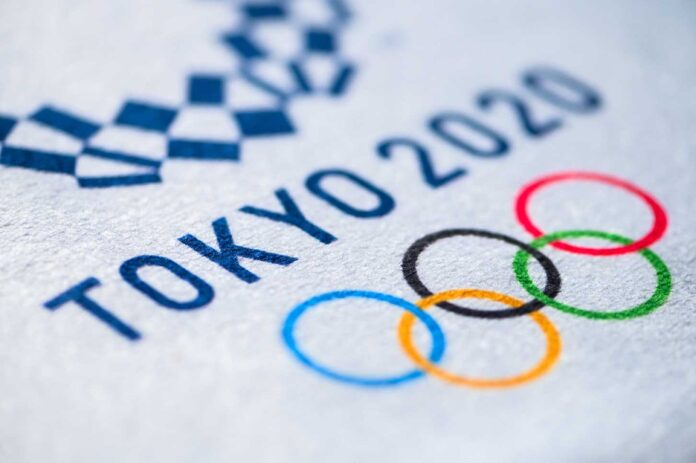The Olympics are underway, which means the television is on non-stop in my house. As a long-time athlete in a variety of sports, I’ll watch any event at any time. Here are three things that are warming my queer heart during this year’s Tokyo Games — plus one way the Olympics are reminding me how much more we have to do for equality.
There are a record 168 out athletes competing in this year’s Games, according to Outsports. Many of these athletes are also using their visibility to speak up in support of LGBTQ inclusion and equality in their home countries and around the world.
Athletes you may already be familiar with, like Tom Daley (Diving, Great Britain) or power couple Megan Rapinoe (Soccer, USA) and Sue Bird (Basketball, USA) have long spoken out for LGBTQ equality and other aspects of social justice, but they’re not the only ones. Polish shooter Aleksandra Jarmolińska was recently featured in a video for Stowarzyszenie Miłość Nie Wyklucza (Love Does Not Exclude Association), which is fighting for marriage equality in Poland. And Canadian soccer player Quinn, the first out nonbinary transgender Olympian, explained on Instagram last year, “I want to be visible to queer folks who don’t see people like them on their feed. I know it saved my life years ago. I want to challenge cis folks … to be better allies.”
Queer parent athletes and athletes with queer parents are among the competitors. Balancing parenting and high-level training, not to mention possible queerphobias in either or both arenas — it’s a lot to handle, and these athletes deserve our respect and admiration. The 13 queer parent Olympians that I know of are: Kelly Brazier (Rugby, New Zealand), Tom Daley (Diving, Great Britain) Lina Hurtig (Soccer/football, Sweden), Hedvig Lindahl (Soccer/football, Sweden), Asya Miller (Goalball – Paralympics, USA), Leilani Mitchell (Basketball, Australia), Sofía Mulanovich (Surfing, Peru), Moran Samuel (Rowing – Paralympics, Israel), Sherida Spitse (Soccer/football, Netherlands), Sam Stosur (Tennis, Australia), Diana Taurasi (Basketball, USA), Stefanie van der Gragt (Soccer/football, Netherlands), Portia Woodman (Rugby, New Zealand). Additionally, at least one Olympian has a queer parent: Jordan Windle (Diving, USA) was raised by a single gay dad.
Transgender women are competing in women’s events as they should. Laurel Hubbard (Weightlifting, New Zealand) is the first out transgender woman to compete in the Games. (BMX freestyle rider Chelsea Wolfe, another transgender woman, is an alternate for Team USA but it is unclear if she will compete.) Some people are objecting to Hubbard’s participation, although she exceeds all International Olympic Committee requirements for her to do so. As Cheryl Reeve, an assistant coach with Team USA Basketball (and a queer parent herself) wrote in a piece for Sports Illustrated earlier this year, however, “Transgender exclusion pits woman athletes against one another, reinforces the harmful notion that there is only one right way to be a woman and distracts us from the real threats to women’s sports.” Let us hope Hubbard’s example helps push back legislation in the U.S. and elsewhere that seeks to ban trans women and girls from competing in women’s and girls’ sports.
Despite the above progress, however, there is still an appalling lack of LGBTQ civil rights in many of the countries participating in the Olympics. Six UN member states definitively impose the death penalty for consensual same-sex sexual activity, according to the International Lesbian, Gay, Bisexual, Trans and Intersex Association’s 2020 “State-Sponsored Homophobia” report: Brunei, Iran, Mauritania, Nigeria (12 northern states), Saudi Arabia, and Yemen. Another five have laws indicating the death penalty could be imposed: Afghanistan, Pakistan, Qatar, Somalia (including Somaliland), and the United Arab Emirates. All of these countries have athletes at the Games, and none are openly LGBTQ. An additional 70 countries have definitive or de facto criminalization of same-sex sexual activity — and others have laws like Hungary, which bans same-sex couples from adopting and prohibits people from sharing with minors any content (even children’s books) about LGBTQ people. Even in host country Japan, where the fight for LGBTQ equality has “picked up speed,” according to GLAAD’s media guide for the Games, there is still no marriage equality nor an LGBTQ anti-discrimination law — and the process for transgender people to change their legal gender remains highly discriminatory, requiring them to undergo surgical sterilization, among other things. The United States falls short in federal anti-discrimination protections, too, as the current push for the Equality Act makes clear. The international nature of the Games, where LGBTQ athletes are more plentiful than ever, should remind us that LGBTQ equality is an issue that needs global support and leadership.
Sports aren’t for everyone, I know. And the International Olympic Committee and other sports organizations have many flaws (a subject for another time). I love the life lessons of sports, though: persistence, leadership, and teamwork; dealing with both success and failure. Participating in sports is not the only way to learn these lessons (music and art are among others), but it is a strong one, and on full display during the Olympics. Anyone who wants to take part in sports should be able to do so. That means working towards a world where anyone, anywhere, is accepted for who they are and encouraged to become who they want to be, in sports or any arena. May we be renewed in our commitment to this as we watch the Games.
Dana Rudolph is the founder and publisher of Mombian (mombian.com), a GLAAD Media Award-winning blog and resource directory, with a searchable database of 700+ LGBTQ family books, media, and more.
